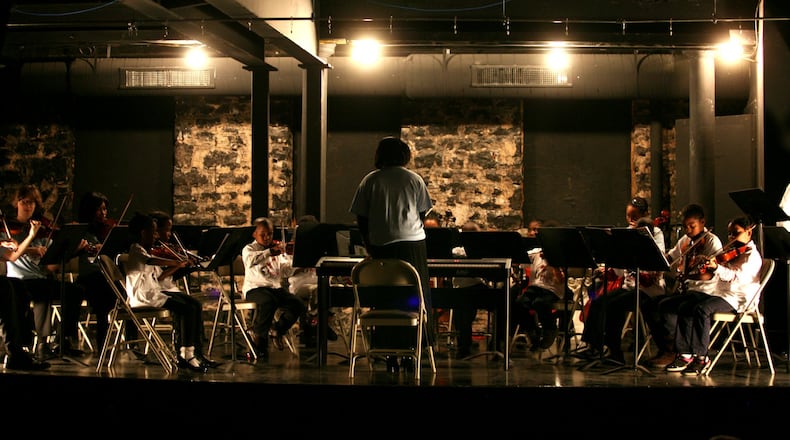Atlanta Music Project (AMP), a nonprofit music training and performance organization for Atlanta youth, is poised to serve roughly 1000 students during its 15th season, which kicked off earlier this month and will conclude in the spring.
It’s a noteworthy jump from the 30 students the organization set out to serve in its inaugural year. In the early days, AMP held most of its programming in The Jeremiah S. Gilbert House and operated out of a free cubicle inside the Atlanta Symphony Orchestra’s office building.
The program’s first-year budget was $150,000. For the current season — which begins with a free performance at South Bend Center for Arts & Culture in early October and concludes with a spring concert May 3 at Morehouse College — it’s roughly $3 million.
Through a series of training and performance opportunities led by nearly 40 degreed teachers at its headquarters, and with local schools, AMP has trained local students, from first grade to high school seniors, in choral, band and orchestra performance. The nonprofit currently has about 40 degreed teachers who serve students, ranging from first graders to high school seniors.
Dantes Rameau, co-founder and CEO, says the organization, which is based in Capitol View, has worked to achieve steady, sustainable growth since its inception. “We’ve never actually grown in leaps and bounds. It’s grown very, very steadily over the years,” he said.
The organization estimates they’ll have given out more than $500,000 in college scholarships by the end of their current season through the nonprofit’s Chestnut Family College Scholarship Fund.
The Chestnut Family Foundation, a philanthropic organization led by Mailchimp founder Ben Chestnut and his wife Teresa, also donated a separate grant for $1,142,000 to AMP last year. Rameau said donations allowed the organization to establish endowments for traveling and maintenance of the nonprofit’s building and instruments.
The travel endowment came in handy this summer, when AMP’s senior youth choir traveled to Auckland, New Zealand, to participate in the 2024 World Choir Games. Led by Atlanta-based conductor B.E. Boykin, the choral group won “O4 Youth Choirs” – an open competition for youth groups.
Credit: Courtesy of Atlanta
Credit: Courtesy of Atlanta
According to Rameau, several students have obtained college acceptance and scholarships based on the skills they’ve learned through the program.
The organization’s services, which include free instruments, group and private training and, in some cases, transportation, have always been essentially free for students. Rameau said families are charged a small registration fee that can be waived.
The co-founder also said many of the students’ free instruments are donated by former musicians in Atlanta through the nonprofit’s donation program or purchased as a result of an anonymous $3,500,000 donation the org received last year.
While the organization has always hosted between 50 and 75 programs each year, Rameau said this year’s concerts and events will include a “little touch of nostalgia” to celebrate the milestone anniversary.
“We want to celebrate where we’ve come from. This is a community organization and part of the secret sauce of our success is that we try to remain a real service to those in the neighborhood and the community. We want to celebrate all those folks that have allowed us to get here,” Rameau said.
Rameau, a Canadian-born bassoonist, received his Bachelor of Music degree from McGill University before obtaining a Master of Music from Yale University. While Rameau was in the Sistema Fellows Program at New England Conservatory, former Turner exec Al Meyers hired him to come to Atlanta once he was done to help create AMP in 2010.
“[I] started developing partnerships and knocking on doors and taking meetings with whoever would take them. And that’s how I ended up here,” Rameau said.
At the time of Rameau’s move, Savannah native Aisha Moody was teaching music education in Cobb County. Having long aspired to start her own program, she built AMP with Rameau and completed the Sistema Fellows Program, which she credits with providing tools needed to run the nonprofit organization, shortly afterwards.
Credit: Quinn West
Credit: Quinn West
The founders said they wanted the nonprofit to serve students in under resourced areas of Atlanta. “The reason why we exist is because we found – and this is common throughout the country – [in] neighborhoods that have socioeconomic levels that are lower, those kids tend to not have access to high quality music training because of the cost, mostly,” Rameau said.
“It’s expensive to buy an instrument, to buy music, to drive to a lesson and pay a teacher. It can cost thousands of dollars per year. A lot of communities get locked out of this wonderful opportunity that is not only good for kids but also allows them to get college scholarships, travel and form friendships with like-minded young people.”
AMP still hosts events at its headquarters and Gilbert House through a partnership with Atlanta’s Parks and Recreation department. The organization has also expanded through community partnerships with local schools.
For the past two seasons, AMP has served roughly two dozen students at Utopian Academy for the Arts in Clayton County, providing a string instruments program twice a week after school. A previous partnership with Atlanta Public Schools allowed the school district to use the nonprofit’s music teachers to fill resource gaps in their classrooms.
If an orchestra class needs help with their violinists, for instance, AMP can provide an instructor to come and work with the students during class. The organization estimates they reached more than 400 students last year through their work with APS.
Credit: Courtesy of Atlanta Music Project
Credit: Courtesy of Atlanta Music Project
Spencer Branch, a freshman at Hampton University, joined the nonprofit’s choral program when he was in second grade. His participation was based largely on his mother, who wanted him engaged in an extracurricular activity that might open the door for college scholarships.
By fifth grade, Branch became bored with chorus. He left the organization but was introduced to the trombone while attending McNair High School, and subsequently rejoined AMP in seventh grade.
As a music-oriented child, Branch said he was enamored with the sound of HBCU marching bands, but also saw band as a way to foster community. “When you’re all collectively trying to strive for something, it’s a lot easier for you guys to bond,” he said. Branch, whose younger sister is now participating in AMP’s choir, received a full tuition scholarship after auditioning for the university’s marching band.
Watching students age and graduate high school inspired AMP’s founders to create a college and career department dedicated to counseling students on college applications. The department also helps them prepare for and record musical auditions.
Chick-fil-A has been another longtime supporter of AMP, with Dan Cathy once inviting students to the company’s headquarters. “Not only did we perform at lunch for the Chick-fil-A employees, Dan actually got up on stage with this trumpet and performed ‘When The Saints Go Marching In’ with one of our trombone players,” Rameau recalled.
Rapper T.I. took a group of AMP students to Washington, D.C., to perform alongside him for NPR’s Tiny Desk in 2018.
Rameau credits the ambition of students and support from local donors with helping the organization have impact for fifteen seasons, and believes they’ll continue to thrive in the future.
“Atlanta has been really, really kind to us. We have been supported by so many of the major corporations and foundations in the city, and in the metro Atlanta area,” Rameau said.
“I think part of the reason why we get that support is because it’s really hard to deny a child that wants to better themselves and who [has] shown a very, very strong commitment to working hard and expressing themselves on stage. How can you deny that?”









